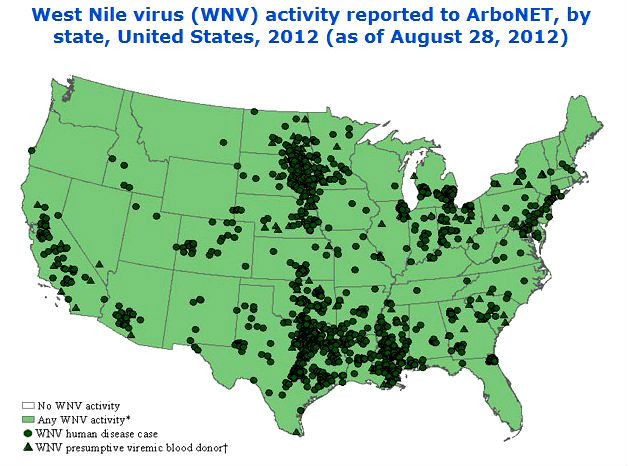West Nile Cases Up By 40% From Last Week

Federal health officials warned on Wednesday that West Nile virus cases are up 40 percent since last week and that the number of infected may continue to rise.
The U.S. Centers for Disease Control and Prevention told reporters in a press conference that a total of 1,590 reported cases of West Nile virus in the United States, including 66 deaths, have been reported through late August this year.
Officials say that the latest numbers represent the highest human toll reported since the mosquito-borne disease was first detected in the country in 1999.
The number of cases is rising quickly and "we think the numbers will continue to rise," said Dr. Lyle Petersen, director of the U .S. Centers for Disease Control and Prevention's Division of Vector-Borne Infectious Diseases, noting that the rise in the number of cases was not unexpected.
"In fact we think the reported numbers will get higher through October," he added.
Of all the reported cases, 56 percent, or 889 people, were classified as neuroinvasive disease (displaying symptoms of severe West Nile infection) and 44 percent, or 701 people, were classified as non-neuroinvasive disease(displaying symptoms of non-severe West Nile infection) .
Officials said Wednesday that 45 percent of the cases have been reported from Texas. The number of confirmed cases spiked to 733, up 197 from last week, and deaths reached 31, up 10 from last week, Dr. David Lakey, commissioner of the Texas Department of State Health Services told reporters at the briefing.
"It looks like it is going to be our worst year ever," said Lakey. "As I look at the data, I'm not convinced we have peaked."
Health officials say that this summer's hot, dry weather may have contributed to the current outbreak, adding that contrary to speculations, Hurricane Isaac will have "no noticeable effect" on the outbreak.
CDC officials say that the best way to avoid being infected is to prevent mosquito bites. Insect repellents with DEET, screens on doors and windows and wearing long sleeves and pants are some of the recommended ways of preventing bites.
The CDC also recommends that people empty standing water from buckets, kiddie pools and other places to prevent mosquito breeding and to be careful at dusk and dawn.



























